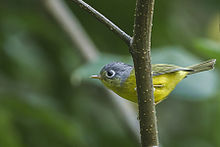White-spectacled warbler
| White-spectacled warbler | |
|---|---|

| |
| From Khangchendzonga National Park, West Sikkim, India. | |
| Scientific classification | |
| Domain: | Eukaryota |
| Kingdom: | Animalia |
| Phylum: | Chordata |
| Class: | Aves |
| Order: | Passeriformes |
| Family: | Phylloscopidae |
| Genus: | Phylloscopus |
| Species: | P. intermedius
|
| Binomial name | |
| Phylloscopus intermedius (La Touche, 1898)
| |
| Synonyms | |
|
Seicercus affinis (Moore, 1854) | |
The white-spectacled warbler (Phylloscopus intermedius) is a species of leaf warbler in the family Phylloscopidae. It is found in Asia from the eastern Himalayas to south-eastern China and southern Vietnam. Its natural habitats are subtropical or tropical moist lowland forests and subtropical or tropical moist montane forests. It was formerly included in the Old World warbler family, Sylviidae.

The white-spectacled warbler was described by the English entomologist and ornithologist Frederic Moore in 1854 and given the binomial name Abrornis affinis.[2][3] In 1898 the Irish ornithologist John David Digues La Touche described another bird to which he gave the binomial name Cryptolopha intermedia.[4] These two taxa were subsequently considered to belong to the same species and were placed in the genus Seicercus.[5][6] A molecular phylogenetic study published in 2018 found that neither Seicercus nor the closely related genus Phylloscopus were monophyletic.[7] In the subsequent reorganization the two genera were merged into Phylloscopus which had priority under the rules of the International Commission on Zoological Nomenclature (ICZN).[8] Before the merger, the nominate subspecies was Seicercus affinis affinis (Moore, F., 1854) but within the enlarged genus the name affinis was occupied by Tickell's leaf warbler Phylloscopus affinis (Tickell, 1833) which had priority. A new name zosterops was introduced to replace affinis, but under the rules of the ICZN the subspecies intermedius now had priority and became the nominate form.[9]
Three subspecies are recognised:[8]
- P. i. zosterops Elliott & del Hoyo, 2016 – east Himalayas to south China, north Laos and central Vietnam
- P. i. intermedius (La Touche, 1898) – central and southeast China
- P. i. ocularis (Robinson & Kloss, 1919) – south Vietnam
References
[edit]- ^ BirdLife International (2018). "Phylloscopus intermedius". IUCN Red List of Threatened Species. 2018: e.T22715430A131881607. doi:10.2305/IUCN.UK.2018-2.RLTS.T22715430A131881607.en. Retrieved 11 November 2021.
- ^ Horsfield, Thomas; Moore, Frederic (1854). A Catalogue of the Birds in the Museum of the Honorable East-India Company. Vol. 1. London: W.H. Allen. p. 341.
- ^ Dickinson, E.C. (2004). "Systematic notes on Asian birds. 46. 'A Catalogue of the Birds in the Museum of the Hon. East-India Company' by Horsfield & Moore". Zoologische Verhandelingen. 350: 149–165.
- ^ La Touche, J.D. (1898). "Cryptolopha intermedia La Touche, sp. n." Bulletin of the British Ornithologists' Club. 7 (51): 37.
- ^ Mayr, Ernst; Cottrell, G. William, eds. (1986). Check-list of Birds of the World. Vol. 11. Cambridge, Massachusetts: Museum of Comparative Zoology. p. 259.
- ^ Dickinson, E.C.; Christidis, L., eds. (2014). The Howard & Moore Complete Checklist of the Birds of the World. Vol. 2: Passerines (4th ed.). Eastbourne, UK: Aves Press. p. 499. ISBN 978-0-9568611-2-2.
- ^ Alström, P.; et al. (2018). "Complete species-level phylogeny of the leaf warbler (Aves: Phylloscopidae) radiation". Molecular Phylogenetics and Evolution. 126: 141–152. doi:10.1016/j.ympev.2018.03.031. PMID 29631054.
- ^ a b Gill, Frank; Donsker, David, eds. (2018). "Bushtits, leaf warblers, reed warblers". World Bird List Version 8.2. International Ornithologists' Union. Retrieved 8 August 2018.
- ^ Alström, P. (2018). del Hoyo, J.; Elliott, A.; Sargatal, J.; Christie, D.A.; de Juana, E. (eds.). "White-spectacled Warbler (Phylloscopus intermedius)". Handbook of the Birds of the World Alive. Lynx Edicions. Retrieved 12 August 2018.

